Unit 1 Advertising reading(Language points)课件
文档属性
| 名称 | Unit 1 Advertising reading(Language points)课件 |
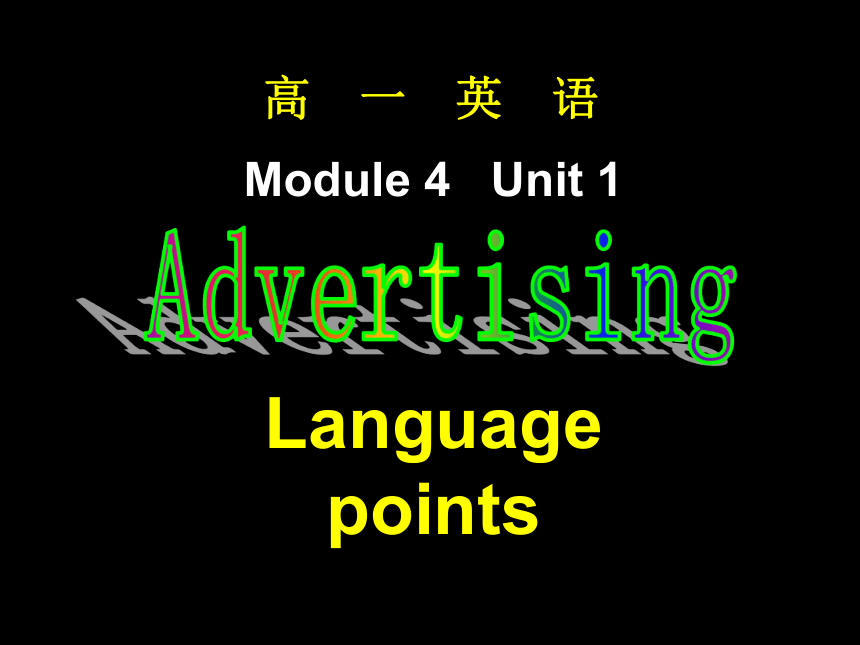
|
|
| 格式 | rar | ||
| 文件大小 | 332.8KB | ||
| 资源类型 | 教案 | ||
| 版本资源 | 牛津译林版 | ||
| 科目 | 英语 | ||
| 更新时间 | 2011-04-02 00:00:00 | ||
图片预览

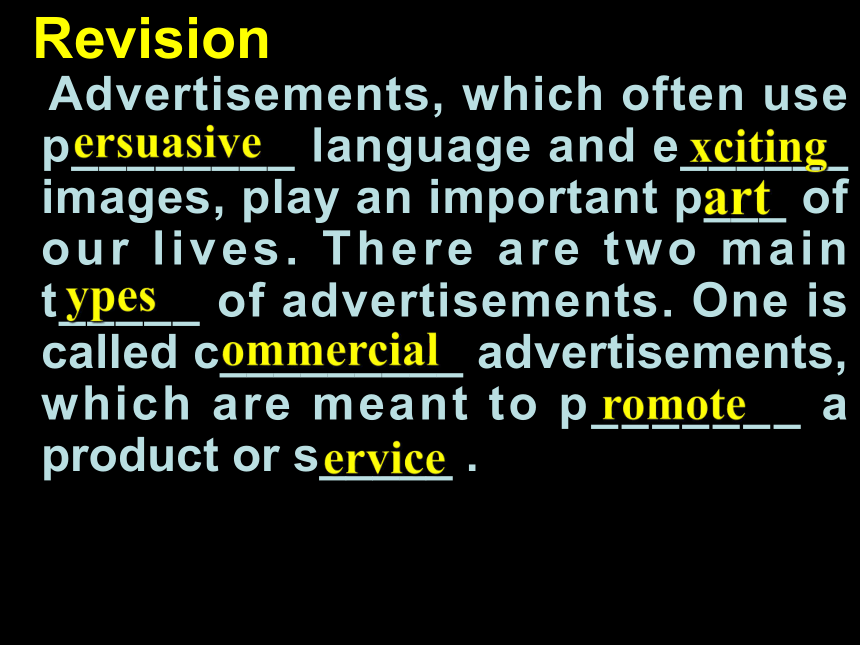
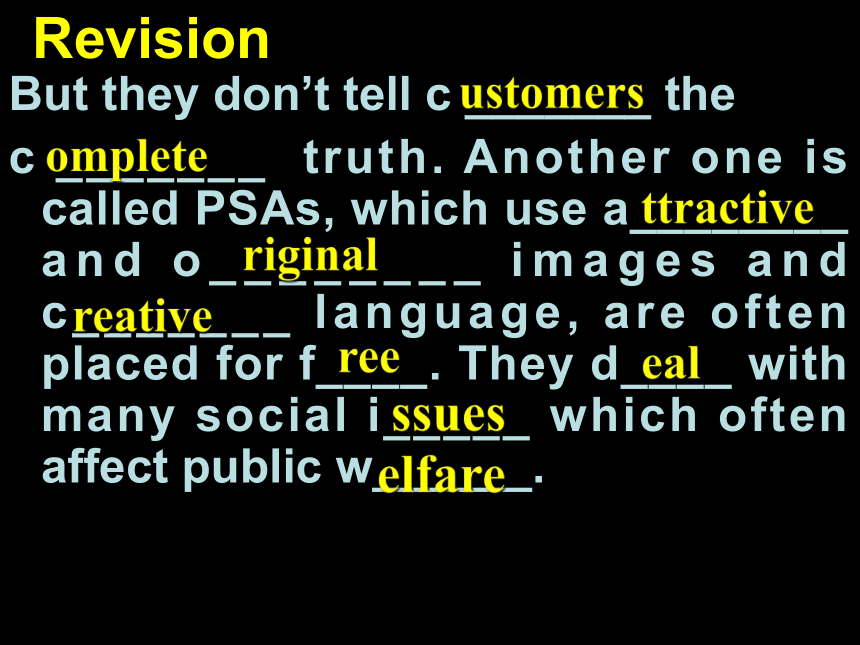
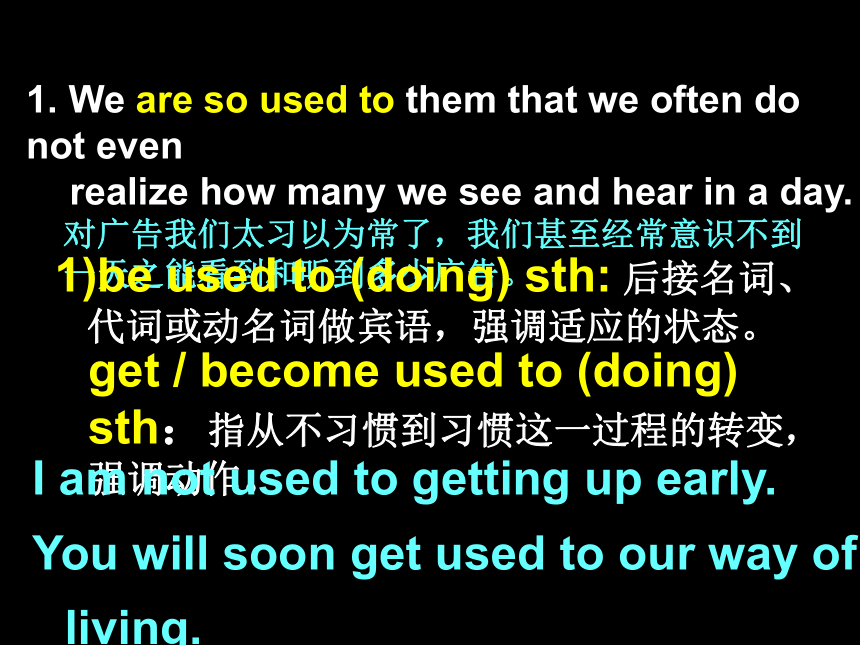
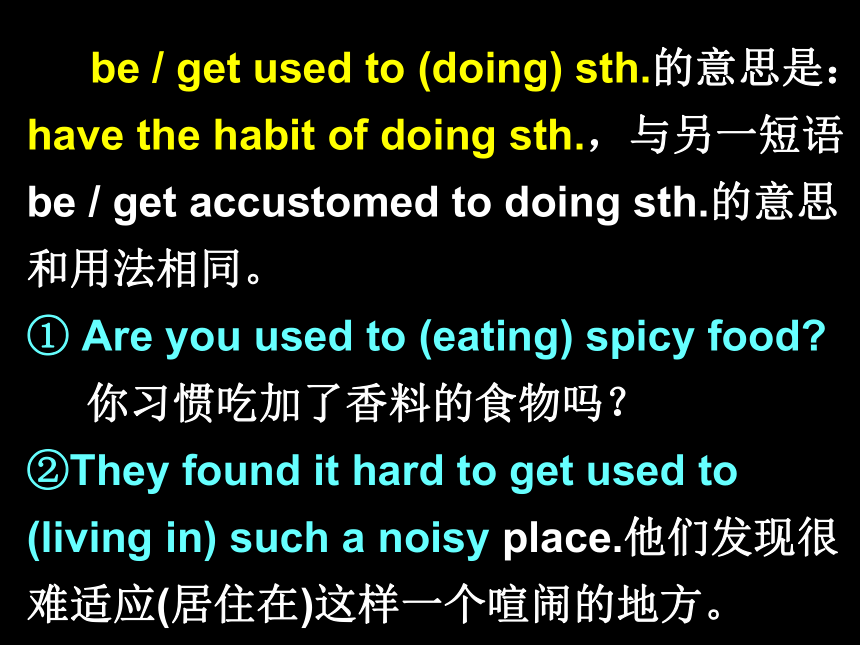
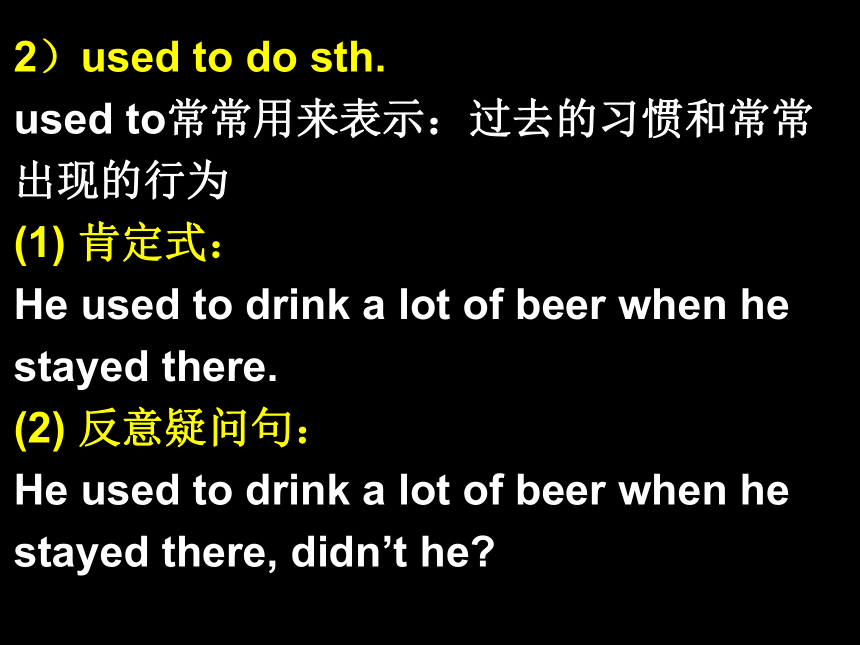
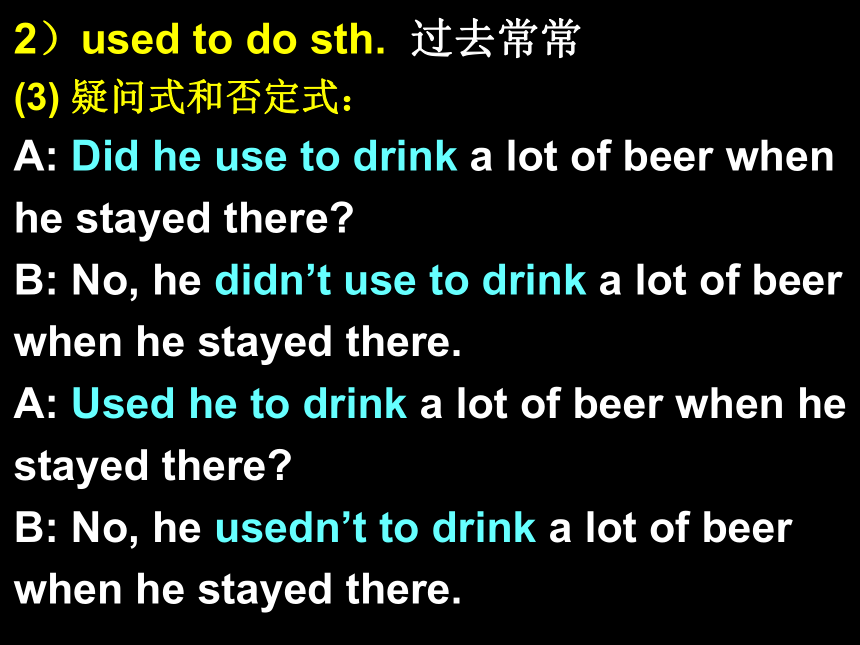

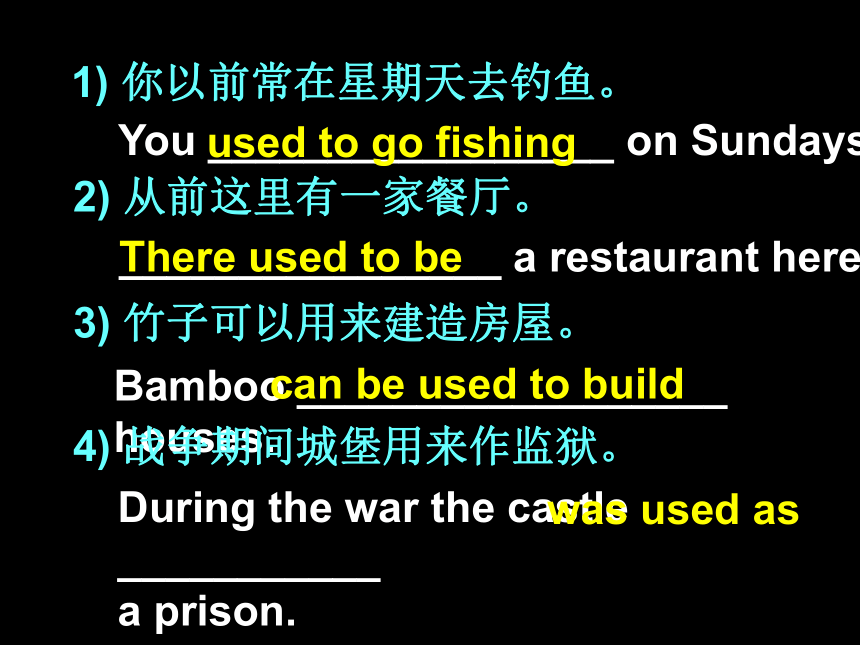
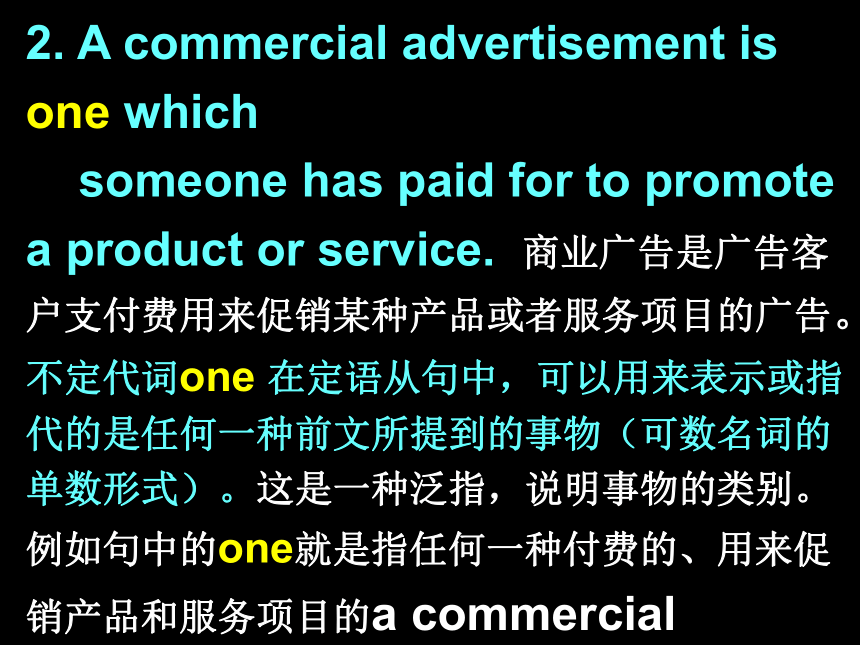
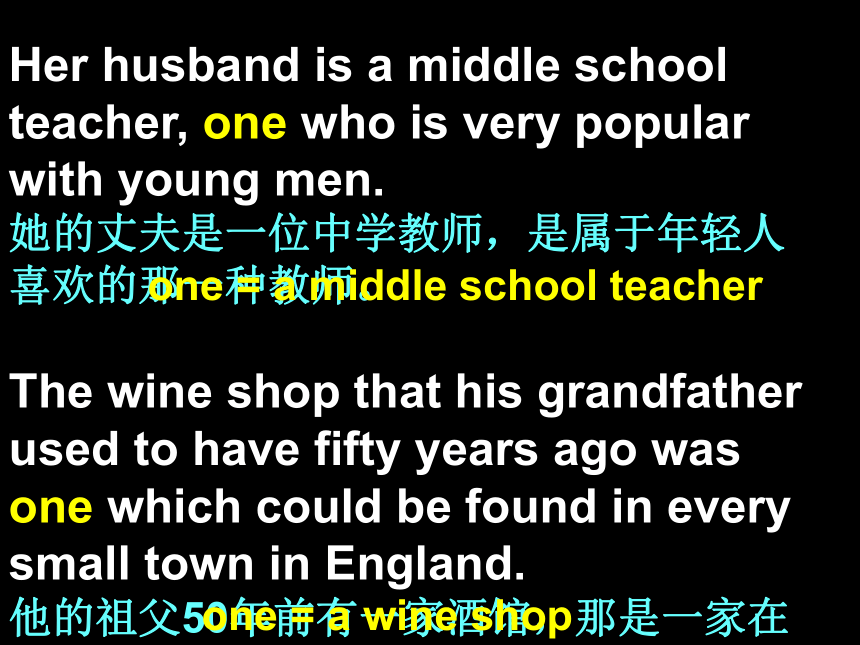
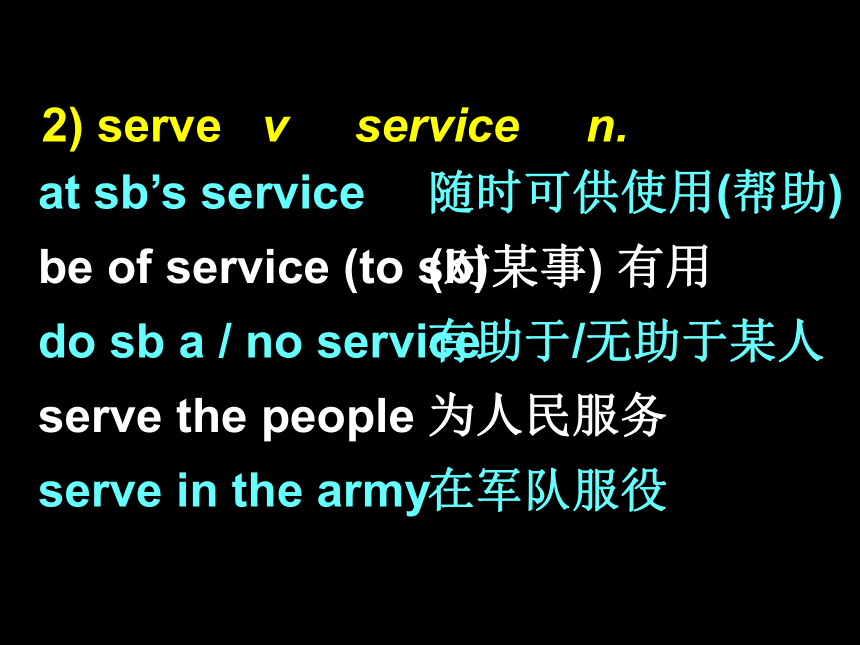
文档简介
课件51张PPT。高 一 英 语Module 4 Unit 1
Language pointsAdvertisingRevision Advertisements, which often use p________ language and e______ images, play an important p___ of our lives. There are two main t_____ of advertisements. One is called c_________ advertisements, which are meant to p_______ a product or s_____ . ersuasivexcitingartypesommercialromoteerviceRevisionBut they don’t tell c _______ the
c _______ truth. Another one is called PSAs, which use a________ and o________ images and c_______ language, are often placed for f____. They d____ with many social i_____ which often affect public w______.ustomersompletettractiveriginalreativereeeal ssueselfare1. We are so used to them that we often do not even
realize how many we see and hear in a day.
对广告我们太习以为常了,我们甚至经常意识不到
一天之能看到和听到多少广告。 be used to (doing) sth: 后接名词、代词或动名词做宾语,强调适应的状态。get / become used to (doing) sth:指从不习惯到习惯这一过程的转变,强调动作。I am not used to getting up early.
You will soon get used to our way of living. be / get used to (doing) sth.的意思是:have the habit of doing sth.,与另一短语be / get accustomed to doing sth.的意思和用法相同。
① Are you used to (eating) spicy food?
你习惯吃加了香料的食物吗?
②They found it hard to get used to (living in) such a noisy place.他们发现很难适应(居住在)这样一个喧闹的地方。2)used to do sth.
used to常常用来表示:过去的习惯和常常出现的行为
(1) 肯定式:
He used to drink a lot of beer when he stayed there.
(2) 反意疑问句:
He used to drink a lot of beer when he stayed there, didn’t he? 2)used to do sth. 过去常常
(3) 疑问式和否定式:
A: Did he use to drink a lot of beer when he stayed there?
B: No, he didn’t use to drink a lot of beer when he stayed there.
A: Used he to drink a lot of beer when he stayed there?
B: No, he usedn’t to drink a lot of beer when he stayed there.My grandma used to be beautiful when was young.
I think my grandma is beautiful because I love her.Bamboo __________________ houses.1) 你以前常在星期天去钓鱼。2) 从前这里有一家餐厅。3) 竹子可以用来建造房屋。You _________________ on Sundays.________________ a restaurant here.used to go fishingThere used to becan be used to build4) 战争期间城堡用来作监狱。During the war the castle ___________
a prison.was used as2. A commercial advertisement is one which
someone has paid for to promote a product or service. 商业广告是广告客户支付费用来促销某种产品或者服务项目的广告。
不定代词one 在定语从句中,可以用来表示或指代的是任何一种前文所提到的事物(可数名词的单数形式)。这是一种泛指,说明事物的类别。例如句中的one就是指任何一种付费的、用来促销产品和服务项目的a commercial advertisement。Her husband is a middle school teacher, one who is very popular with young men.
她的丈夫是一位中学教师,是属于年轻人喜欢的那一种教师。
The wine shop that his grandfather used to have fifty years ago was one which could be found in every small town in England.
他的祖父50年前有一家酒馆,那是一家在英格兰每一个小镇上都可以找得到的小酒馆。 one = a middle school teacherone = a wine shop2) serve v service n.at sb’s service
be of service (to sb)
do sb a / no service
serve the people
serve in the army随时可供使用(帮助)
(对某事) 有用
有助于/无助于某人
为人民服务
在军队服役3. PSAs are often placed for free, and are intended to educate people about health, safety, or any other issue which affects public welfare. 公益广告经常是免费的,其目的是向民众提供关于健康或者其它影响到公共利益的知识。
1) for free:without payment 免费的
There are many movies on the Internet and you can download and watch them for free.网络上有很多电影,你可以下载免费观看。 2) intend to do sth.
intend vt. to have in one’s mind as a plan or
purpose; mean to do sth.
(1) intend sth. or to do sth.
He took it as an insult, which was not at all what I had intended.
他把这看成了一种侮辱,可我根本就没有这个意思。
She intended to catch the early train but she got up too late.
她本打算赶早班火车,但她早上起得太晚了。(2) intend sb. to do sth.
It was meant to be a surprise; I didn’t intend you to see it so soon. 这本来是要成为一件意外的惊喜,我本来就没有想让你那么早就看到的。
(3) be intended for (have a plan for in the mind) (为…而) 准备;预定
The chair was intended for you, but she took it away. 那椅子本来是给你准备的,可是给她搬走了。
All these books are intended for children from six to ten.这些书都是给6-10岁的孩子们准备的。 The newly-published book, which
refers ____ basic English grammar
is ____ only for beginners. A. as; meant B. for; intended
C. to; planned D. to; intended4. However, we still must be aware of the methods used in advertisements to try and sell us things.
尽管如此,我们对商业广告中所使用的技法还要有所意识:它们的意图都是要向我们兜售商品。
1) be aware of:having knowledge or
understanding of 知道;明白;意识到。(也可以用作be aware that-clause.)
The parents were soon aware of the problem their children might meet with in the forest.
家长们很快就意识到孩子们在森林里可能遇到的问题。
He became aware that his new investment was quite risky.他意识到他的新投资有很大的风险。1) We must be fully aware of the importance
of the international situation today.
2) 司机没有意识到前面的危险。
The bus driver ______________ the
danger ahead.
3) 你有没有觉察到你已经伤害到她的感情了?
________________ you have hurt her
feelings?wasn’t aware of Are you aware that 2) 名词 + 过去分词短语
在这个结构中,过去分词短语相当于一个定语从句。
① the methods used in advertisements to try and sell us things
= the method which are used in advertisement to try to sell us things
2) 名词 + 过去分词短语
② the bridge built 2000 years ago
= the bridge that was built 2000 years ago
③ the soldiers wounded in the battle
= the soldiers who were wounded in the battle
2) 名词 + 过去分词短语
④ the books found in the that old house
= the books that were found in that old housea book that is written by Jim
a knife that was made of bamboo
the boy who was raised on the farm
the tree was blown down in the wind
a man is injured in the accidenta book written by Jim
a knife made of bamboo
the boy raised on the farm
the tree blown down in the wind
a man injured in the accident5. Even if an ad does not lie, it does not mean it tells you the complete truth. 广告即使不撒谎,这也不意味着它会跟你百分之百地讲真话。
连词even if / even though用来表达让步状语从句,其意思是:no matter if; though 即使;纵然;虽然;尽管。
Even if / Even though we can afford it, we wouldn’t
do abroad for our holidays because we don’t want.
即使我们有能力,我们也不去国外度假。因为我们不想去。They had to go out to work, even though / even if it was raining hard.
尽管下着大雨,他们还得出去工作。
Mr. Ma wouldn’t stop working even though / if he was very tired because he wanted to finish the work ahead of time.虽然很累了,马先生还是不愿停下来,因为他想提前完成工作。
She won’t leave the TV set even if / even though the programs are very boring.
即使节目十分乏味,她也不愿意离开电视机。 Even if / Even though we can afford it, we wouldn’t do abroad for our holidays because we don’t want.
即使我们有能力,我们也不去国外度假。因为我们不想去。
They had to go out to work, even though / even if it was raining hard.
尽管下着大雨,他们还得出去工作。Put the following into Chinese:
1. I won’t go to the party if I am not invited.
2. I won’t go to the party unless (I am) invited.
3. I won’t go to the party even if (I am) invited.
4. I won’t go to the party though / although invited.Put the following into Chinese:
1. I’ll go to the party if I am invited.
2. I’ll go to the party though / although I not invited.
3. I’ll go to the party even if / though I am not invited.6. One supermarket tells customers, ‘You are proud of your cooking, so shouldn’ t you buy the very freshest food?’
有一家超市对顾客如此说道,‘你为自己的厨艺而感到自豪,难道不需要购买如此新鲜到家的生鲜食品吗?’
形容词very的基本用法:very的词义是(used for giving force to expression用于加强语气)actual 正是那一个的,正是的。① This is the very house in which the great writer lived when he was in his twenties. 这正是这位伟大作家二十多岁时所居住的那所房子。
② They say that he died in that very bed.
他们说他就是死在那张 床上的。
③ I found it at the very bottom (=right at the bottom) of the box.
我正是在这个箱子的底部找到的。7. We must not fall for this kind of trick. 我们决不能轻信这种小把戏而上当啊!短语动词fall for有两种用法:
1)to be deceived by 受…的骗;上…的当。Margaret’s parents told her not to fall for his tricks.
玛格丽特的父母要她别上他的当。
7. We must not fall for this kind of trick.
我们决不能轻信这种小把戏而上当啊!
短语动词fall for有两种用法:
1)to be deceived by 受…的骗;上…的当。
Margaret’s parents told her not to fall for his tricks.
玛格丽特的父母要她别上他的当。
2)fall in love with, especially suddenly (突然)
倾心于…;爱上…;被…迷上。
Margaret fell for him in a big way.
玛格丽特完全迷上了他。8. Not all ads play tricks on us though. 然而,不是所有的广告都跟我们玩这类把戏。
1) not all 表示部分否定
不定代词all, every, both,以及与他们相关的其它不定代词(everyone, everybody, everything, ) 和副词(always, often),在构成否定句的时候会出现两种否定情况:部分否定和全部否定。(1) 部分否定:
① Not all the students attended the meeting this afternoon. 不是所有的学生都出席了今天下午的会议。(有人缺席)
② The teacher didn’t go over every exercise-book.老师没有改完全部的练习本。(只改了一部分)
③ Not everybody / everyone has passed the exam.不是所有的学生都通过了考试。(还是有人及格)(1) 部分否定:
④ They don’t eat out every Saturday evening.
他们不是每个星期六傍晚都到外面吃饭。(有时候不去)
⑤ My brother is not always late for school.
我的兄弟上学不是总迟到。(有时候不迟到)(2)全部否定:
① No students / None of the students attended the meeting this afternoon. 没有任何学生出席了
今天下午的会议。(没有学生到会)
② The teacher went over none of the exercise-books.老师没有批改一个练习本。(一个本子都没有改)
③ Nobody / No one has passed the physics exam.没有任何学生通过了物理考试。(全部都不及格)
④ They never eat out on Saturday evenings.他们从不在星期六傍晚外出吃饭。(没有例外)
⑤ My brother is never late for school.
我的兄弟上学从来不迟到。(没有例外)2) though的副词用法:
作为副词,though 不能用于句首,常常位于句末或句中。其词义是:in spite of the fact; nevertheless 虽然;尽管;可是;不过。
It is hard work to be tourist guide; I enjoy it though.当导游是一件辛苦的差事,我到很乐意干者工作。
He is a bad manager. There is no reason, though, to dismiss him.
他是一个差劲的经理,然而,却没有什么理由来解雇他。10. These ads deal with large social issues.
这些广告涉及一些重大的社会问题。
1) take action about 处理;应付;对付
All the complaints will be dealt with by the sales manager.
所有这些投诉将由销售经理来处理。
How will you deal with the boy who has broken the classroom window?
你打算如何处理那个砸碎教室玻璃的男生?2) be about; have as a subject 涉及;论及;讨论
This book deals with the trouble in Ireland.这本书讨论爱尔兰的各种纠纷。
Last week, Mrs. Baker wrote an article dealing with the housing problem in our city.
上周贝克尔太太写了一篇关于我们城市住房问题的文章。3) do business with; trade with 跟…做生意;与…做交易
I have dealt with that supermarket for nearly ten years.
我跟那家超市做生意差不多有10年了。11. One of these is ‘Smoking is committing suicide slowly.’ 其中之一就是:‘吸烟就等于慢性自杀’。
动词commit的词义是do something illegal, wrong or foolish。做不合法的、错误的或者愚蠢的事情。commit suicide
commit murder
commit theft
commit a blunder
commit an unforgivable error自杀
谋杀
行窃
犯大错
犯不可饶恕的错误13. …which tells you what you are supposed to learn from
the passage---‘We must not fall for this kind of trick!’ …告诉你应该从文章中学到的东西---‘我们决不能轻信这种小把戏而上当啊!’
be supposed to do的意思是be expected to do; be required to do; should do被期望、被要求做某事、应该。
Am I supposed to clean all the room or just this one?
我是应该打扫所有的房间,还是只着一间?
You are supposed to pay the bill by Friday.
你最晚在星期五结清这笔帐。
I think you are supposed to arrive here before 9 o’clock tomorrow morning.
我认为你应该在明天上午9点之前到达这里。Homework
B1 and B2 on page 91
Language pointsAdvertisingRevision Advertisements, which often use p________ language and e______ images, play an important p___ of our lives. There are two main t_____ of advertisements. One is called c_________ advertisements, which are meant to p_______ a product or s_____ . ersuasivexcitingartypesommercialromoteerviceRevisionBut they don’t tell c _______ the
c _______ truth. Another one is called PSAs, which use a________ and o________ images and c_______ language, are often placed for f____. They d____ with many social i_____ which often affect public w______.ustomersompletettractiveriginalreativereeeal ssueselfare1. We are so used to them that we often do not even
realize how many we see and hear in a day.
对广告我们太习以为常了,我们甚至经常意识不到
一天之能看到和听到多少广告。 be used to (doing) sth: 后接名词、代词或动名词做宾语,强调适应的状态。get / become used to (doing) sth:指从不习惯到习惯这一过程的转变,强调动作。I am not used to getting up early.
You will soon get used to our way of living. be / get used to (doing) sth.的意思是:have the habit of doing sth.,与另一短语be / get accustomed to doing sth.的意思和用法相同。
① Are you used to (eating) spicy food?
你习惯吃加了香料的食物吗?
②They found it hard to get used to (living in) such a noisy place.他们发现很难适应(居住在)这样一个喧闹的地方。2)used to do sth.
used to常常用来表示:过去的习惯和常常出现的行为
(1) 肯定式:
He used to drink a lot of beer when he stayed there.
(2) 反意疑问句:
He used to drink a lot of beer when he stayed there, didn’t he? 2)used to do sth. 过去常常
(3) 疑问式和否定式:
A: Did he use to drink a lot of beer when he stayed there?
B: No, he didn’t use to drink a lot of beer when he stayed there.
A: Used he to drink a lot of beer when he stayed there?
B: No, he usedn’t to drink a lot of beer when he stayed there.My grandma used to be beautiful when was young.
I think my grandma is beautiful because I love her.Bamboo __________________ houses.1) 你以前常在星期天去钓鱼。2) 从前这里有一家餐厅。3) 竹子可以用来建造房屋。You _________________ on Sundays.________________ a restaurant here.used to go fishingThere used to becan be used to build4) 战争期间城堡用来作监狱。During the war the castle ___________
a prison.was used as2. A commercial advertisement is one which
someone has paid for to promote a product or service. 商业广告是广告客户支付费用来促销某种产品或者服务项目的广告。
不定代词one 在定语从句中,可以用来表示或指代的是任何一种前文所提到的事物(可数名词的单数形式)。这是一种泛指,说明事物的类别。例如句中的one就是指任何一种付费的、用来促销产品和服务项目的a commercial advertisement。Her husband is a middle school teacher, one who is very popular with young men.
她的丈夫是一位中学教师,是属于年轻人喜欢的那一种教师。
The wine shop that his grandfather used to have fifty years ago was one which could be found in every small town in England.
他的祖父50年前有一家酒馆,那是一家在英格兰每一个小镇上都可以找得到的小酒馆。 one = a middle school teacherone = a wine shop2) serve v service n.at sb’s service
be of service (to sb)
do sb a / no service
serve the people
serve in the army随时可供使用(帮助)
(对某事) 有用
有助于/无助于某人
为人民服务
在军队服役3. PSAs are often placed for free, and are intended to educate people about health, safety, or any other issue which affects public welfare. 公益广告经常是免费的,其目的是向民众提供关于健康或者其它影响到公共利益的知识。
1) for free:without payment 免费的
There are many movies on the Internet and you can download and watch them for free.网络上有很多电影,你可以下载免费观看。 2) intend to do sth.
intend vt. to have in one’s mind as a plan or
purpose; mean to do sth.
(1) intend sth. or to do sth.
He took it as an insult, which was not at all what I had intended.
他把这看成了一种侮辱,可我根本就没有这个意思。
She intended to catch the early train but she got up too late.
她本打算赶早班火车,但她早上起得太晚了。(2) intend sb. to do sth.
It was meant to be a surprise; I didn’t intend you to see it so soon. 这本来是要成为一件意外的惊喜,我本来就没有想让你那么早就看到的。
(3) be intended for (have a plan for in the mind) (为…而) 准备;预定
The chair was intended for you, but she took it away. 那椅子本来是给你准备的,可是给她搬走了。
All these books are intended for children from six to ten.这些书都是给6-10岁的孩子们准备的。 The newly-published book, which
refers ____ basic English grammar
is ____ only for beginners. A. as; meant B. for; intended
C. to; planned D. to; intended4. However, we still must be aware of the methods used in advertisements to try and sell us things.
尽管如此,我们对商业广告中所使用的技法还要有所意识:它们的意图都是要向我们兜售商品。
1) be aware of:having knowledge or
understanding of 知道;明白;意识到。(也可以用作be aware that-clause.)
The parents were soon aware of the problem their children might meet with in the forest.
家长们很快就意识到孩子们在森林里可能遇到的问题。
He became aware that his new investment was quite risky.他意识到他的新投资有很大的风险。1) We must be fully aware of the importance
of the international situation today.
2) 司机没有意识到前面的危险。
The bus driver ______________ the
danger ahead.
3) 你有没有觉察到你已经伤害到她的感情了?
________________ you have hurt her
feelings?wasn’t aware of Are you aware that 2) 名词 + 过去分词短语
在这个结构中,过去分词短语相当于一个定语从句。
① the methods used in advertisements to try and sell us things
= the method which are used in advertisement to try to sell us things
2) 名词 + 过去分词短语
② the bridge built 2000 years ago
= the bridge that was built 2000 years ago
③ the soldiers wounded in the battle
= the soldiers who were wounded in the battle
2) 名词 + 过去分词短语
④ the books found in the that old house
= the books that were found in that old housea book that is written by Jim
a knife that was made of bamboo
the boy who was raised on the farm
the tree was blown down in the wind
a man is injured in the accidenta book written by Jim
a knife made of bamboo
the boy raised on the farm
the tree blown down in the wind
a man injured in the accident5. Even if an ad does not lie, it does not mean it tells you the complete truth. 广告即使不撒谎,这也不意味着它会跟你百分之百地讲真话。
连词even if / even though用来表达让步状语从句,其意思是:no matter if; though 即使;纵然;虽然;尽管。
Even if / Even though we can afford it, we wouldn’t
do abroad for our holidays because we don’t want.
即使我们有能力,我们也不去国外度假。因为我们不想去。They had to go out to work, even though / even if it was raining hard.
尽管下着大雨,他们还得出去工作。
Mr. Ma wouldn’t stop working even though / if he was very tired because he wanted to finish the work ahead of time.虽然很累了,马先生还是不愿停下来,因为他想提前完成工作。
She won’t leave the TV set even if / even though the programs are very boring.
即使节目十分乏味,她也不愿意离开电视机。 Even if / Even though we can afford it, we wouldn’t do abroad for our holidays because we don’t want.
即使我们有能力,我们也不去国外度假。因为我们不想去。
They had to go out to work, even though / even if it was raining hard.
尽管下着大雨,他们还得出去工作。Put the following into Chinese:
1. I won’t go to the party if I am not invited.
2. I won’t go to the party unless (I am) invited.
3. I won’t go to the party even if (I am) invited.
4. I won’t go to the party though / although invited.Put the following into Chinese:
1. I’ll go to the party if I am invited.
2. I’ll go to the party though / although I not invited.
3. I’ll go to the party even if / though I am not invited.6. One supermarket tells customers, ‘You are proud of your cooking, so shouldn’ t you buy the very freshest food?’
有一家超市对顾客如此说道,‘你为自己的厨艺而感到自豪,难道不需要购买如此新鲜到家的生鲜食品吗?’
形容词very的基本用法:very的词义是(used for giving force to expression用于加强语气)actual 正是那一个的,正是的。① This is the very house in which the great writer lived when he was in his twenties. 这正是这位伟大作家二十多岁时所居住的那所房子。
② They say that he died in that very bed.
他们说他就是死在那张 床上的。
③ I found it at the very bottom (=right at the bottom) of the box.
我正是在这个箱子的底部找到的。7. We must not fall for this kind of trick. 我们决不能轻信这种小把戏而上当啊!短语动词fall for有两种用法:
1)to be deceived by 受…的骗;上…的当。Margaret’s parents told her not to fall for his tricks.
玛格丽特的父母要她别上他的当。
7. We must not fall for this kind of trick.
我们决不能轻信这种小把戏而上当啊!
短语动词fall for有两种用法:
1)to be deceived by 受…的骗;上…的当。
Margaret’s parents told her not to fall for his tricks.
玛格丽特的父母要她别上他的当。
2)fall in love with, especially suddenly (突然)
倾心于…;爱上…;被…迷上。
Margaret fell for him in a big way.
玛格丽特完全迷上了他。8. Not all ads play tricks on us though. 然而,不是所有的广告都跟我们玩这类把戏。
1) not all 表示部分否定
不定代词all, every, both,以及与他们相关的其它不定代词(everyone, everybody, everything, ) 和副词(always, often),在构成否定句的时候会出现两种否定情况:部分否定和全部否定。(1) 部分否定:
① Not all the students attended the meeting this afternoon. 不是所有的学生都出席了今天下午的会议。(有人缺席)
② The teacher didn’t go over every exercise-book.老师没有改完全部的练习本。(只改了一部分)
③ Not everybody / everyone has passed the exam.不是所有的学生都通过了考试。(还是有人及格)(1) 部分否定:
④ They don’t eat out every Saturday evening.
他们不是每个星期六傍晚都到外面吃饭。(有时候不去)
⑤ My brother is not always late for school.
我的兄弟上学不是总迟到。(有时候不迟到)(2)全部否定:
① No students / None of the students attended the meeting this afternoon. 没有任何学生出席了
今天下午的会议。(没有学生到会)
② The teacher went over none of the exercise-books.老师没有批改一个练习本。(一个本子都没有改)
③ Nobody / No one has passed the physics exam.没有任何学生通过了物理考试。(全部都不及格)
④ They never eat out on Saturday evenings.他们从不在星期六傍晚外出吃饭。(没有例外)
⑤ My brother is never late for school.
我的兄弟上学从来不迟到。(没有例外)2) though的副词用法:
作为副词,though 不能用于句首,常常位于句末或句中。其词义是:in spite of the fact; nevertheless 虽然;尽管;可是;不过。
It is hard work to be tourist guide; I enjoy it though.当导游是一件辛苦的差事,我到很乐意干者工作。
He is a bad manager. There is no reason, though, to dismiss him.
他是一个差劲的经理,然而,却没有什么理由来解雇他。10. These ads deal with large social issues.
这些广告涉及一些重大的社会问题。
1) take action about 处理;应付;对付
All the complaints will be dealt with by the sales manager.
所有这些投诉将由销售经理来处理。
How will you deal with the boy who has broken the classroom window?
你打算如何处理那个砸碎教室玻璃的男生?2) be about; have as a subject 涉及;论及;讨论
This book deals with the trouble in Ireland.这本书讨论爱尔兰的各种纠纷。
Last week, Mrs. Baker wrote an article dealing with the housing problem in our city.
上周贝克尔太太写了一篇关于我们城市住房问题的文章。3) do business with; trade with 跟…做生意;与…做交易
I have dealt with that supermarket for nearly ten years.
我跟那家超市做生意差不多有10年了。11. One of these is ‘Smoking is committing suicide slowly.’ 其中之一就是:‘吸烟就等于慢性自杀’。
动词commit的词义是do something illegal, wrong or foolish。做不合法的、错误的或者愚蠢的事情。commit suicide
commit murder
commit theft
commit a blunder
commit an unforgivable error自杀
谋杀
行窃
犯大错
犯不可饶恕的错误13. …which tells you what you are supposed to learn from
the passage---‘We must not fall for this kind of trick!’ …告诉你应该从文章中学到的东西---‘我们决不能轻信这种小把戏而上当啊!’
be supposed to do的意思是be expected to do; be required to do; should do被期望、被要求做某事、应该。
Am I supposed to clean all the room or just this one?
我是应该打扫所有的房间,还是只着一间?
You are supposed to pay the bill by Friday.
你最晚在星期五结清这笔帐。
I think you are supposed to arrive here before 9 o’clock tomorrow morning.
我认为你应该在明天上午9点之前到达这里。Homework
B1 and B2 on page 91
